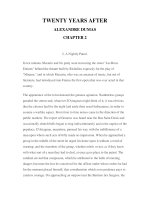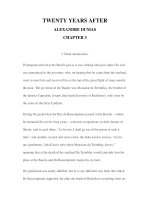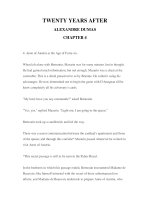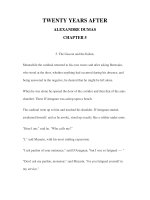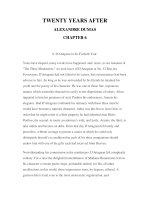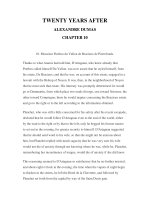LUYỆN ĐỌC TIẾNG ANH QUA CÁC TÁC PHẨM VĂN HỌC –TWENTY YEARS AFTER ALEXANDRE DUMAS CHAPTER 74 docx
Bạn đang xem bản rút gọn của tài liệu. Xem và tải ngay bản đầy đủ của tài liệu tại đây (25.25 KB, 9 trang )
TWENTY YEARS AFTER
ALEXANDRE DUMAS
CHAPTER 74
74. How Musqueton, after being very nearly roasted, had a Narrow Escape of
being eaten.
A deep silence reigned for a long time in the boat after the fearful scene
described.
The moon, which had shone for a short time, disappeared behind the clouds;
every object was again plunged in the obscurity that is so awful in the deserts
and still more so in that liquid desert, the ocean, and nothing was heard save the
whistling of the west wind driving along the tops of the crested billows.
Porthos was the first to speak.
"I have seen," he said, "many dreadful things, but nothing that ever agitated me
so much as what I have just witnessed. Nevertheless, even in my present state of
perturbation, I protest that I feel happy. I have a hundred pounds' weight less
upon my chest. I breathe more freely." In fact, Porthos breathed so loud as to do
credit to the free play of his powerful lungs.
"For my part," observed Aramis, "I cannot say the same as you do, Porthos. I
am still terrified to such a degree that I scarcely believe my eyes. I look around
the boat, expecting every moment to see that poor wretch holding between his
hands the poniard plunged into his heart."
"Oh! I feel easy," replied Porthos. "The poniard was pointed at the sixth rib and
buried up to the hilt in his body. I do not reproach you, Athos, for what you
have done. On the contrary, when one aims a blow that is the regulation way to
strike. So now, I breathe again I am happy!"
"Don't be in haste to celebrate a victory, Porthos," interposed D'Artagnan;
"never have we incurred a greater danger than we are now encountering. Men
may subdue men they cannot overcome the elements. We are now on the sea,
at night, without any pilot, in a frail bark; should a blast of wind upset the boat
we are lost."
Musqueton heaved a deep sigh.
"You are ungrateful, D'Artagnan," said Athos; "yes, ungrateful to Providence, to
whom we owe our safety in the most miraculous manner. Let us sail before the
wind, and unless it changes we shall be drifted either to Calais or Boulogne.
Should our bark be upset we are five of us good swimmers, able enough to turn
it over again, or if not, to hold on by it. Now we are on the very road which all
the vessels between Dover and Calais take, 'tis impossible but that we should
meet with a fisherman who will pick us up."
"But should we not find any fisherman and should the wind shift to the north?"
"That," said Athos, "would be quite another thing; and we should nevermore see
land until we were upon the other side of the Atlantic."
"Which implies that we may die of hunger," said Aramis.
"'Tis more than possible," answered the Comte de la Fere.
Musqueton sighed again, more deeply than before.
"What is the matter? what ails you?" asked Porthos.
"I am cold, sir," said Musqueton.
"Impossible! your body is covered with a coating of fat which preserves it from
the cold air."
"Ah! sir, 'tis this very coating of fat that makes me shiver."
"How is that, Musqueton?
"Alas! your honor, in the library of the Chateau of Bracieux there are a lot of
books of travels."
"What then?"
"Amongst them the voyages of Jean Mocquet in the time of Henry IV."
"Well?"
"In these books, your honor, 'tis told how hungry voyagers, drifting out to sea,
have a bad habit of eating each other and beginning with "
"The fattest among them!" cried D'Artagnan, unable in spite of the gravity of
the occasion to help laughing.
"Yes, sir," answered Musqueton; "but permit me to say I see nothing laughable
in it. However," he added, turning to Porthos, "I should not regret dying, sir,
were I sure that by doing so I might still be useful to you."
"Mouston," replied Porthos, much affected, "should we ever see my castle of
Pierrefonds again you shall have as your own and for your descendants the
vineyard that surrounds the farm."
"And you should call it `Devotion,'" added Aramis; "the vineyard of self-
sacrifice, to transmit to latest ages the recollection of your devotion to your
master."
"Chevalier," said D'Artagnan, laughing, "you could eat a piece of Mouston,
couldn't you, especially after two or three days of fasting?"
"Oh, no," replied Aramis, "I should much prefer Blaisois; we haven't known
him so long."
One may readily conceive that during these jokes which were intended chiefly
to divert Athos from the scene which had just taken place, the servants, with the
exception of Grimaud, were not silent. Suddenly Musqueton uttered a cry of
delight, taking from beneath one of the benches a bottle of wine; and on looking
more closely in the same place he discovered a dozen similar bottles, bread, and
a monster junk of salted beef.
"Oh, sir!" he cried, passing the bottle to Porthos, "we are saved the bark is
supplied with provisions."
This intelligence restored every one save Athos to gayety.
"Zounds!" exclaimed Porthos, "'tis astonishing how empty violent agitation
makes the stomach."
And he drank off half a bottle at a draught and bit great mouthfuls of the bread
and meat.
"Now," said Athos, "sleep, or try to sleep, my friends, and I will watch."
In a few moments, notwithstanding their wet clothes, the icy blast that blew and
the previous scene of terror, these hardy adventurers, with their iron frames,
inured to every hardship, threw themselves down, intending to profit by the
advice of Athos, who sat at the helm, pensively wakeful, guiding the little bark
the way it was to go, his eyes fixed on the heavens, as if he sought to verify not
only the road to France, but the benign aspect of protecting Providence. After
some hours of repose the sleepers were aroused by Athos.
Dawn was shedding its pallid, placid glimmer on the purple ocean, when at the
distance of a musket shot from them was seen a dark gray mass, above which
gleamed a triangular sail; then masters and servants joined in a fervent cry to the
crew of that vessel to hear them and to save.
"A bark!" all cried together.
It was, in fact, a small craft from Dunkirk bound for Boulogne.
A quarter of an hour afterward the rowboat of this craft took them all aboard.
Grimaud tendered twenty guineas to the captain, and at nine o'clock in the
morning, having a fair wind, our Frenchmen set foot on their native land.
"Egad! how strong one feels here!" said Porthos, almost burying his large feet in
the sands. "Zounds! I could defy a nation!"
"Be quiet, Porthos," said D'Artagnan, "we are observed."
"We are admired, i'faith," answered Porthos.
"These people who are looking at us are only merchants," said Athos, "and are
looking more at the cargo than at us."
"I shall not trust to that," said the lieutenant, "and I shall make for the Dunes* as
soon as possible."
*Sandy hills about Dunkirk, from which it derives its name.
The party followed him and soon disappeared with him behind the hillocks of
sand unobserved. Here, after a short conference, they proposed to separate.
"And why separate?" asked Athos.
"Because," answered the Gascon, "we were sent, Porthos and I, by Cardinal
Mazarin to fight for Cromwell; instead of fighting for Cromwell we have served
Charles I. not the same thing by any means. In returning with the Comte de la
Fere and Monsieur d'Herblay our crime would be confirmed. We have
circumvented Cromwell, Mordaunt, and the sea, but we shall find a certain
difficulty in circumventing Mazarin."
"You forget," replied Athos, "that we consider ourselves your prisoners and not
free from the engagement we entered into."
"Truly, Athos," interrupted D'Artagnan, "I am vexed that such a man as you are
should talk nonsense which schoolboys would be ashamed of. Chevalier," he
continued, addressing Aramis, who, leaning proudly on his sword, seemed to
agree with his companion, "Chevalier, Porthos and I run no risk; besides, should
any ill-luck happen to two of us, will it not be much better that the other two
should be spared to assist those who may be apprehended? Besides, who knows
whether, divided, we may not obtain a pardon you from the queen, we from
Mazarin which, were we all four together, would never be granted. Come,
Athos and Aramis, go to the right; Porthos, come with me to the left; these
gentlemen should file off into Normandy, whilst we, by the nearest road, reach
Paris."
He then gave his friends minute directions as to their route.
"Ah! my dear friend," exclaimed Athos, "how I should admire the resources of
your mind did I not stop to adore those of your heart."
And he gave him his hand.
"Isn't this fox a genius, Athos?" asked the Gascon. "No! he knows how to
crunch fowls, to dodge the huntsman and to find his way home by day or by
night, that's all. Well, is all said?"
"All."
"Then let's count our money and divide it. Ah! hurrah! there's the sun! A merry
morning to you, Sunshine. 'Tis a long time since I saw thee!"
"Come, come, D'Artagnan," said Athos, "do not affect to be strong-minded;
there are tears in your eyes. Let us be open with each other and sincere."
"What!" cried the Gascon, "do you think, Athos, we can take leave, calmly, of
two friends at a time not free from danger to you and Aramis?"
"No," answered Athos; "embrace me, my son."
"Zounds!" said Porthos, sobbing, "I believe I'm crying; but how foolish all this
is!"
Then they embraced. At that moment their fraternal bond of union was closer
than ever, and when they parted, each to take the route agreed on, they turned
back to utter affectionate expressions, which the echoes of the Dunes repeated.
At last they lost sight of each other.
"Sacrebleu! D'Artagnan," said Porthos, "I must out with it at once, for I can't
keep to myself anything I have against you; I haven't been able to recognize you
in this matter."
"Why not?" said D'Artagnan, with his wise smile.
"Because if, as you say, Athos and Aramis are in real danger, this is not the time
to abandon them. For my part, I confess to you that I was all ready to follow
them and am still ready to rejoin them, in spite of all the Mazarins in the world."
"You would be right, Porthos, but for one thing, which may change the current
of your ideas; and that is, that it is not those gentlemen who are in the greatest
danger, it is ourselves; it is not to abandon them that we have separated, but to
avoid compromising them."
"Really?" said Porthos, opening his eyes in astonishment.
"Yes, no doubt. If they are arrested they will only be put in the Bastile; if we are
arrested it is a matter of the Place de Greve."
"Oh! oh!" said Porthos, "there is quite a gap between that fate and the baronial
coronet you promised me, D'Artagnan."
"Bah! perhaps not so great as you think, Porthos; you know the proverb, `All
roads lead to Rome.'"
"But how is it that we are incurring greater risks than Athos and Aramis?" asked
Porthos.
"Because they have but fulfilled the mission confided to them by Queen
Henrietta and we have betrayed that confided to us by Mazarin; because, going
hence as emissaries to Cromwell, we became partisans of King Charles;
because, instead of helping cut off the royal head condemned by those fellows
called Mazarin, Cromwell, Joyce, Bridge, Fairfax, etc., we very nearly
succeeded in saving it."
"Upon my word that is true," said Porthos; "but how can you suppose, my dear
friend, that in the midst of his great preoccupations General Cromwell has had
time to think "
"Cromwell thinks of everything; Cromwell has time for everything; and believe
me, dear friend, we ought not to lose our time it is precious. We shall not be
safe till we have seen Mazarin, and then "
"The devil!" said Porthos; "what can we say to Mazarin?"
"Leave that to me I have my plan. He laughs best who laughs last. Cromwell
is mighty, Mazarin is tricky, but I would rather have to do with them than with
the late Monsieur Mordaunt."
"Ah!" said Porthos, "it is very pleasant to be able to say `the late Monsieur
Mordaunt.'"
"My faith, yes," said D'Artagnan. "But we must be going."
The two immediately started across country toward the road to Paris, followed
by Musqueton, who, after being too cold all night, at the end of a quarter of an
hour found himself too warm.

